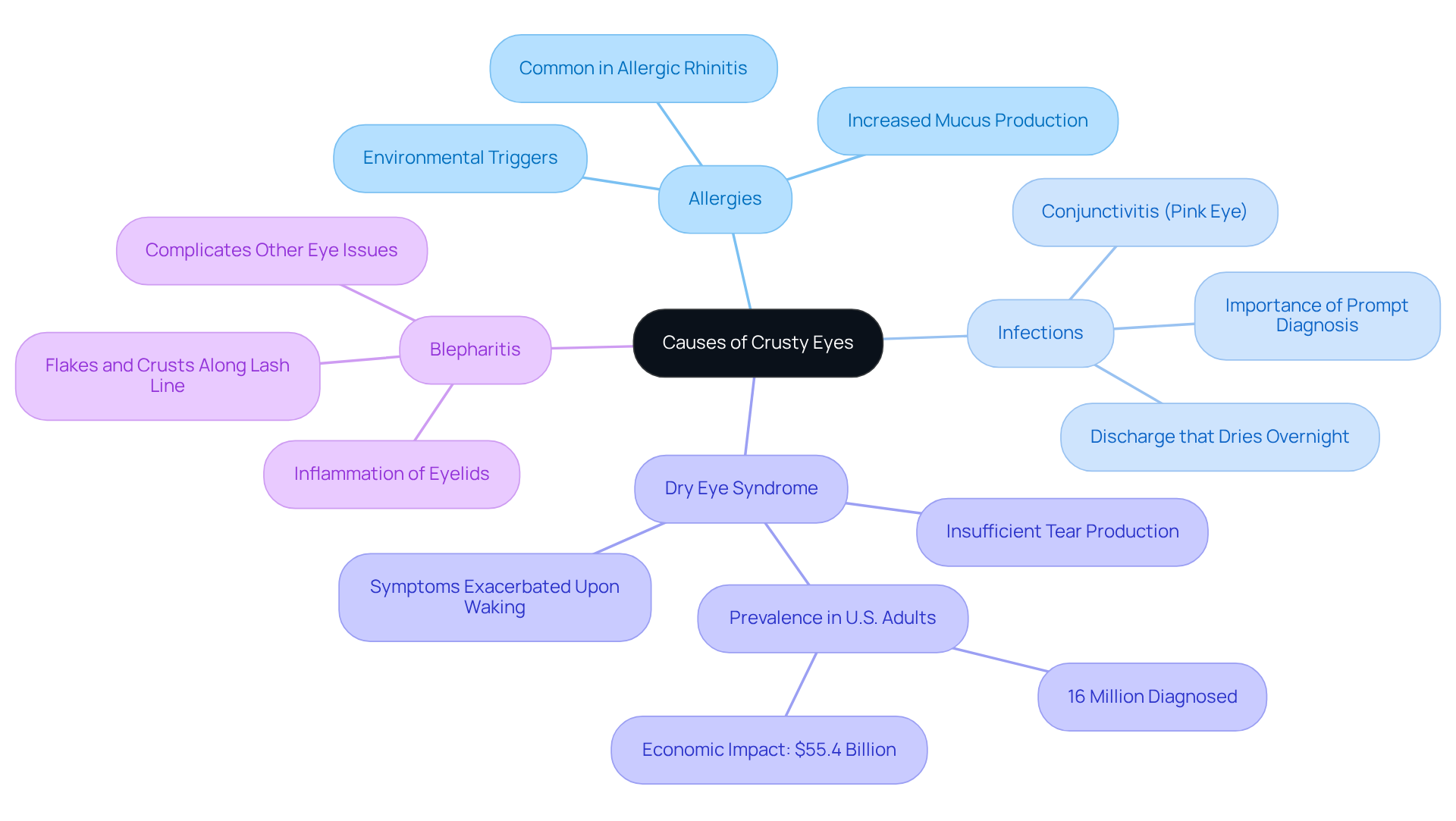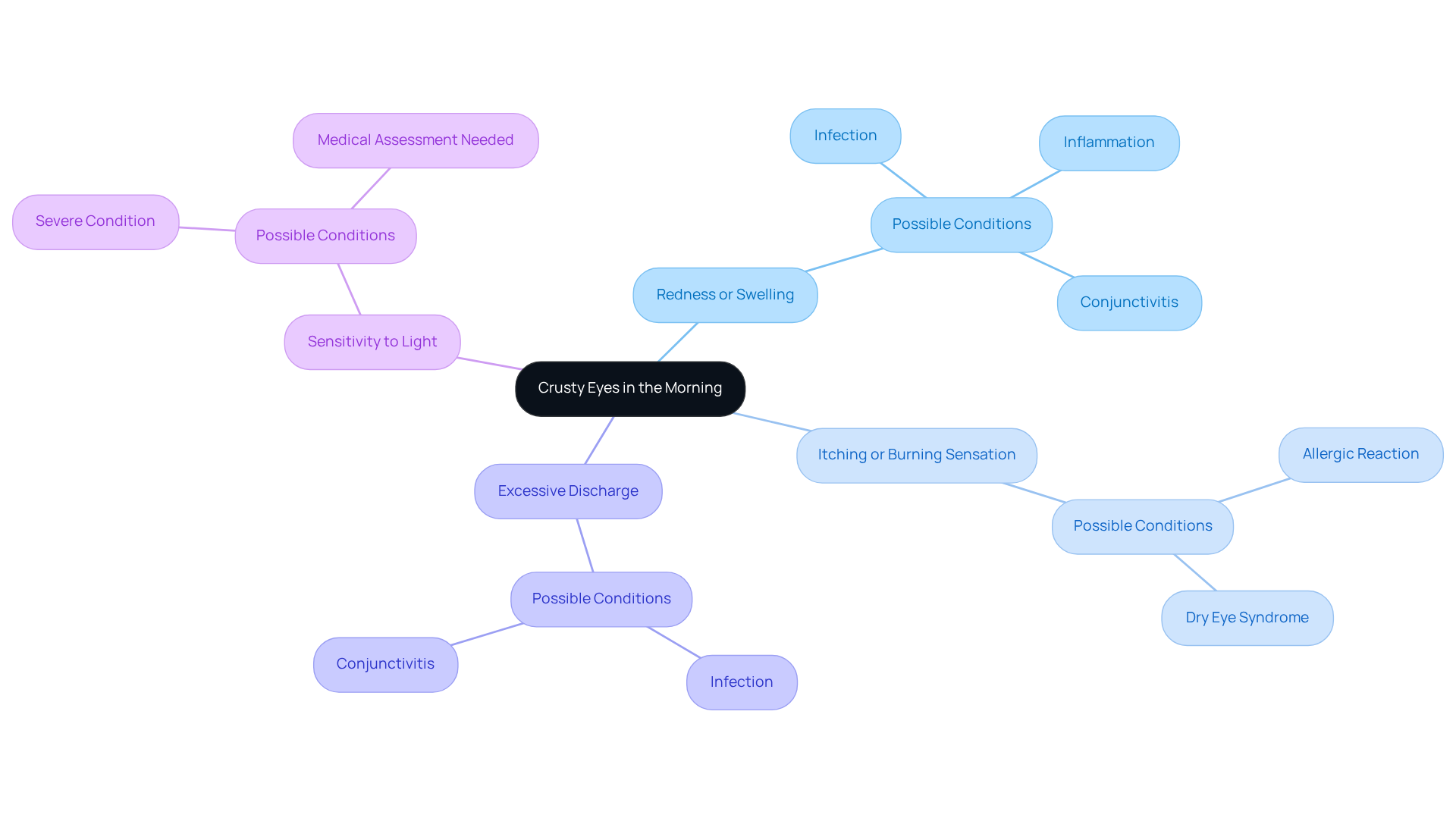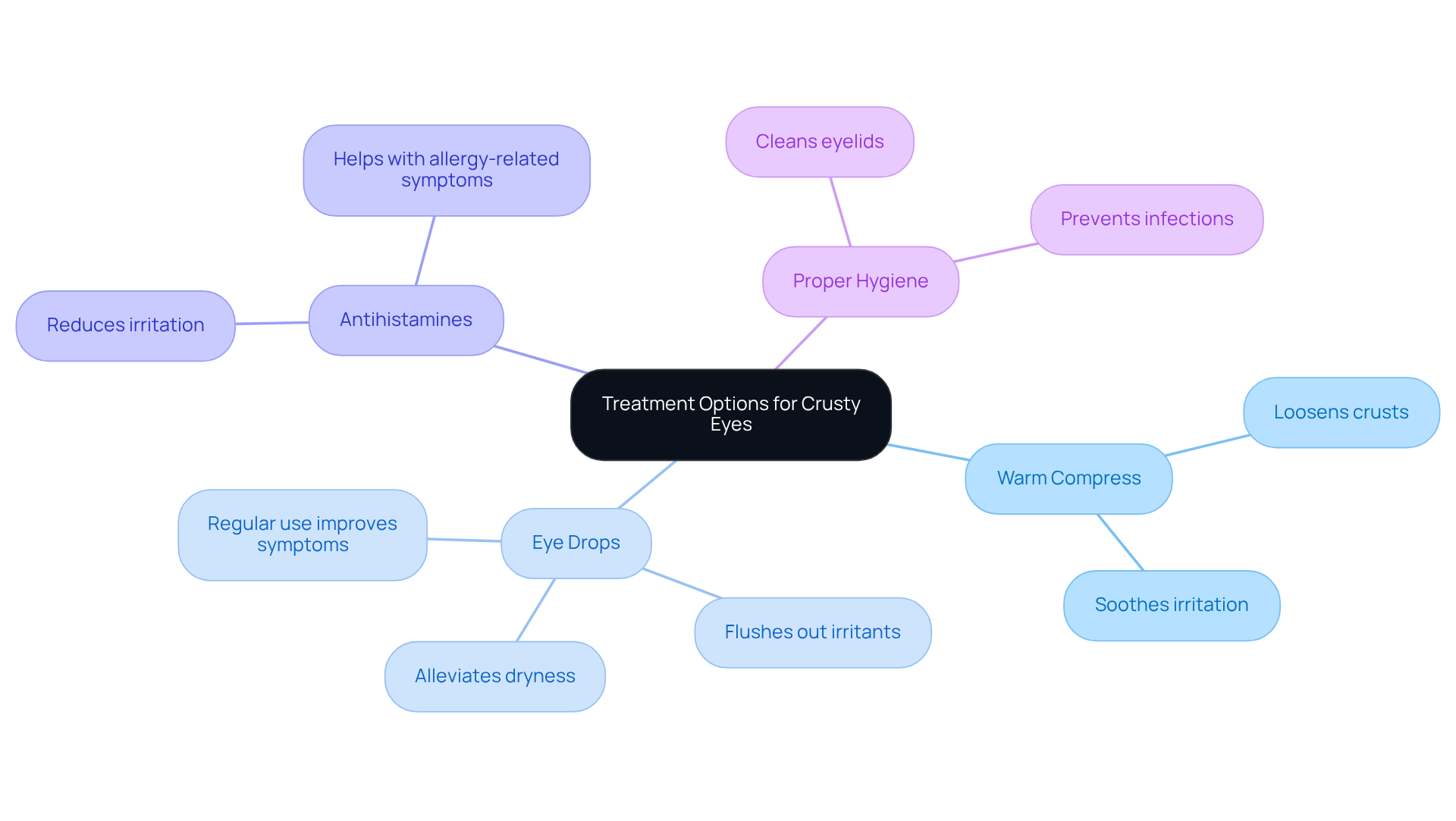Posted by: Northwest Eye in General on August 11, 2025
Overview
Waking up with crusty eyes can be frustrating and uncomfortable. It’s important to know that this condition can arise from various factors, such as:
- Allergies
- Infections like conjunctivitis
- Dry eye syndrome
- Blepharitis
We understand that experiencing these symptoms can be concerning, and recognizing the underlying causes is the first step toward relief.
To alleviate discomfort and improve your eye health, seeking appropriate treatment is essential. Simple measures like:
- Warm compresses
- Eye drops
- Maintaining good hygiene practices
can make a significant difference. Remember, you are not alone in this; many people have faced similar issues and found effective solutions. We are here to help you through this process, ensuring you feel supported every step of the way.
Introduction
Waking up to crusty eyes can feel more than just inconvenient; it often signals underlying issues that deserve your attention. We understand that this common morning annoyance can stem from allergies, infections, or even dry eye syndrome. Recognizing the causes and symptoms is crucial for finding effective remedies and ensuring your optimal eye health.
But when do these seemingly minor symptoms warrant a visit to a healthcare professional? Exploring the nuances of crusty eyes not only provides relief but also empowers you to take charge of your eye care. Remember, you are not alone in this journey, and we are here to help you through it.
Identify the Causes of Crusty Eyes
Waking up with crusty eyes in the morning can be uncomfortable and concerning. It’s important to understand that various factors can contribute to this irritation. Here are some common causes that might resonate with your experience:
- Allergies: Many people find that allergic reactions to environmental triggers, such as pollen, dust, or pet dander, can lead to increased mucus production. This often leads to experiencing crusty eyes in the morning. Recent studies reveal that allergies are a frequent cause of morning eye discharge, particularly for those with a history of allergic rhinitis.
- Infections: Conditions like conjunctivitis, commonly referred to as pink eye, can create discharge that dries overnight, resulting in crustiness. A case study has shown that conjunctivitis significantly contributes to morning eye discharge, highlighting the importance of prompt diagnosis and treatment to alleviate discomfort and prevent complications.
- Dry Eye Syndrome: Insufficient tear production can leave your eyes feeling dry and irritated, leading to crust formation. It’s worth noting that over 16 million adults in the U.S. are diagnosed with dry eye disease, which can exacerbate these issues, especially upon waking. The economic impact of dry eye disease is substantial, costing the U.S. economy more than $55.4 billion each year, underscoring the necessity of addressing these concerns.
- Blepharitis: This condition involves inflammation of the eyelids, which can lead to flakes and crusts forming along the lash line. Understanding the is crucial, as it often occurs alongside other eye issues, complicating the overall clinical picture.
Determining the exact cause of your crusty eyes in the morning is essential for effective treatment. We encourage you to reflect on any recent changes in your environment or health that may have contributed to your condition. Seeking guidance from an eye care expert can provide you with personalized recommendations. Remember, addressing these underlying causes is vital for improving your overall eye health, and we are here to help you through this process.

Recognize Symptoms and Signs
To effectively tackle crusty eyes in the morning, we understand that it’s important to identify . Look for:
- Redness or Swelling: This may indicate a possible infection or inflammation, such as conjunctivitis or other eye infections.
- Itching or Burning Sensation: These feelings are common in allergic reactions or dry eye syndrome, which can lead to irritation and discomfort.
- Excessive Discharge: This can be a sign of infection, particularly if the discharge is yellow or green, often associated with conjunctivitis.
- Sensitivity to Light: This could suggest a more severe condition needing medical assessment, especially if paired with additional signs.
It’s common to feel overwhelmed when facing these symptoms, but it’s important to know that these signs can be associated with several conditions, including conjunctivitis, dry eye disease, and keratoconus. If you encounter any of these signs alongside crusty eyes in the morning, it may be time to explore care alternatives or seek advice from a healthcare expert. Remember, addressing these issues promptly can help prevent severe health complications, and we are here to help you through this process.

Implement Treatment Options
We understand that waking up with crusty eyes in the morning can be uncomfortable and concerning. To help you find relief, consider implementing the following treatment options:
- Warm Compress: Applying a warm, damp cloth to your eyes for 5-10 minutes can work wonders. This simple step helps loosen crusts and soothe irritation, promoting comfort and relief.
- Eye Drops: Using artificial tears or lubricating eye drops can significantly alleviate dryness and flush out irritants. Many patients report finding relief within a month of regular use, highlighting the effectiveness of these drops in addressing dry eye disease.
- Antihistamines: If allergies are contributing to your discomfort, over-the-counter antihistamines can be a helpful solution to reduce irritation and discomfort.
- Proper Hygiene: It’s essential to gently clean your eyelids with a mild soap or eyelid scrub. This practice removes debris and helps prevent potential infections, particularly for those who experience crusty eyes in the morning.
While these procedures can often be carried out at home, we encourage you to observe your symptoms closely. If you experience ongoing discomfort or notice any worsening issues, please reach out to an ophthalmologist. They can explore various options tailored to your needs, ensuring you receive the best care possible. Remember, we are here to help you through this process.

Know When to Seek Medical Attention
While many cases of crusty eyes can be managed at home, we understand that it can be concerning. It’s important to recognize certain signs that indicate when you should seek medical attention:
- Persistent Symptoms: If your symptoms do not improve after a few days of home treatment, it’s wise to consult a professional.
- Severe Pain: Experiencing intense discomfort or pain in the eye area is a signal that you should not ignore.
- Vision Changes: Any sudden changes in vision should be evaluated immediately by a healthcare provider.
- Fever or Systemic Symptoms: If you have accompanying fever or other systemic symptoms, this may indicate a more serious infection.
If you experience any of these signs, please reach out to your healthcare provider or an eye care specialist for further evaluation and treatment. Remember, we are here to help you through this process.

Conclusion
Waking up with crusty eyes can be frustrating and uncomfortable, often caused by allergies, infections, dry eye syndrome, or blepharitis. We understand how concerning this can be, and recognizing these underlying factors is essential for finding effective solutions to alleviate discomfort and improve your overall eye health.
In this guide, we’ve highlighted key points, including the importance of recognizing symptoms such as:
- Redness
- Itching
- Excessive discharge
Practical treatment options, like:
- Warm compresses
- Eye drops
- Proper hygiene practices
can provide significant relief. It’s also important to know when to seek medical attention for persistent or severe symptoms to ensure that more serious conditions are not overlooked.
Ultimately, addressing crusty eyes in the morning is not just about immediate relief; it’s about taking proactive steps toward better eye health. Whether through home remedies or professional care, staying informed and responsive to your symptoms can lead to meaningful improvements. Prioritize your eye health and remember, we are here to help you through this process. Consulting a healthcare professional when needed can prevent complications and enhance your quality of life.
Frequently Asked Questions
What are some common causes of crusty eyes in the morning?
Common causes include allergies, infections like conjunctivitis, dry eye syndrome, and blepharitis.
How do allergies contribute to crusty eyes?
Allergies to environmental triggers such as pollen, dust, or pet dander can increase mucus production, leading to crusty eyes upon waking.
What role do infections play in causing crusty eyes?
Infections like conjunctivitis (pink eye) can produce discharge that dries overnight, resulting in crustiness in the morning.
What is dry eye syndrome and how does it relate to crusty eyes?
Dry eye syndrome is characterized by insufficient tear production, which can cause dryness and irritation, leading to crust formation. Over 16 million adults in the U.S. are affected by this condition.
What is blepharitis and how does it contribute to crusty eyes?
Blepharitis is inflammation of the eyelids that can cause flakes and crusts to form along the lash line, complicating other eye issues.
Why is it important to determine the exact cause of crusty eyes?
Identifying the specific cause is essential for effective treatment and improving overall eye health.
What should I do if I experience crusty eyes frequently?
It is recommended to reflect on any recent changes in your environment or health and seek guidance from an eye care expert for personalized recommendations.






